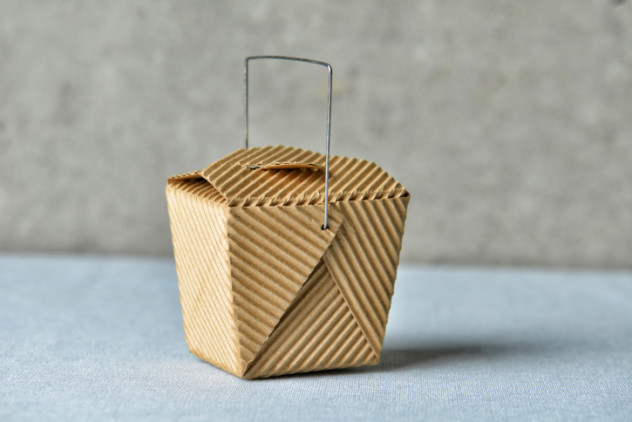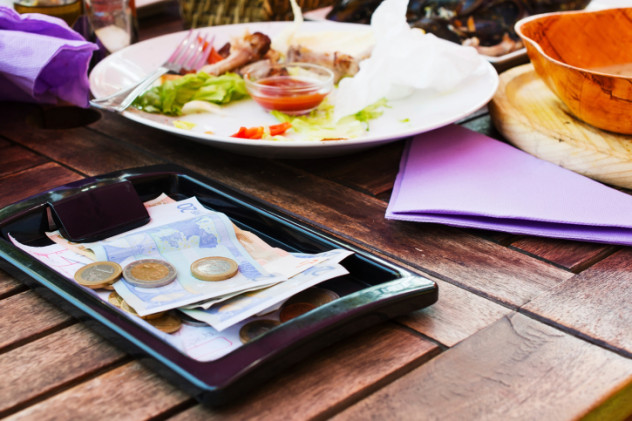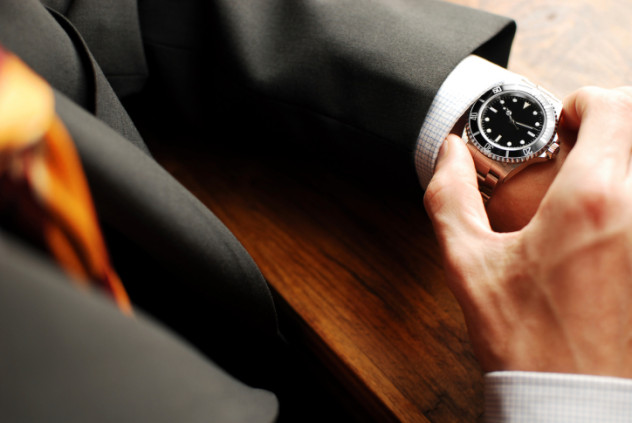(单词翻译:单击)
5.Doggie Bags
5.打包袋
Asking for a doggie bag on a date may make a person appear cheap. The waiter may even give an annoyed look as he makes his way through the busy restaurant, filled with hungry customers waiting for him to take their order, all so he can retrieve a bag or box for some customer whose eyes were bigger than their stomach. In ancient Rome, however, doggie bags were a way of life.
在约会的时候要打包袋会让你显得小气。服务员甚至会显得很恼怒的样子,因为他们好不容易穿过满是饥饿的顾客的大厅,等着他拿他们的订单,同时还要取打包袋或打包盒给一些顾客,这些顾客的眼比胃大。然而在古罗马,打包袋却是一种生活方式。

Whenever someone had friends over for dinner, he or she gave the guests a fine cloth napkin in which to take home fruit. This was more of a demand than a suggestion, as the decision to not take home food was interpreted as an insult to the host. Furthermore, such a guest would quickly gain a reputation for being impolite and ungrateful. Doggie bags can trace their origins back to ancient China as well. It was polite for a host to give guests white boxes to take food home in.
每当有朋友过来吃饭,主人都会给客人精美的细布餐巾用来带水果回家。相较于建议来说不如说这是要求,因为你不把食物带回家会被认为是对主人的侮辱。此外,这样的客人将很快获得失礼和忘恩负义的坏名声。打包袋在中国也可以追溯到起源。主人们给客人提供白盒以带食物回家才是有礼貌的。
4.Tipping
4.给小费

To tip or not to tip, that has long been the question. Usually, it comes down to whether we want to appear cheap or not. Not tipping has been the cause of many dirty looks. It is also a common reason why many first dates never lead to second ones. Some restaurants have even banned the custom in order to save their diners from being stressed out at the end of their meal.
给小费或者不给小费,这一直是个问题。通常,它取决于我们是不是想显得小气。没有给小费会招来许多白眼。这也是为什么许多约会有第一次却再也没有第二次的原因。有些餐馆甚至禁止给小费的习俗以挽留他们的顾客,使他们在用餐结束时不用有压力。
Japan is light-years ahead. The Japanese are so unaccustomed to tipping that doing so tends to result in confusion. The server wonders why he or she was given extra money, and this may lead to a long awkward attempt to give it back. More importantly, tipping can be seen as an insult. It is sometimes seen as a charity that implies pity. In the event that a customer wants to express their gratitude, it is best to do so with a small gift. Or, if money is given, it is best to place it in an envelope first, and then give it to the server.
日本领先在世界前沿。日本人都不习惯给小费,因为这样做往往会导致混乱。服务员会想知道为什么他或她被给予额外的钱,而这可能会导致服务员陷入长长的尴尬并且试图把小费还回去。更重要的是,小费会被看作是一种侮辱。它有时被看作是一个表示同情的慈善施舍。当顾客想要表达自己的感激之情时,最好是送小礼物。或者,如果非要给钱的话,最好是把它放在一个信封,然后再送给服务员。
3.Eating With Your Hands
3.用手吃饭

Eating with your hands has always been the quickest way to upset parents at the dinner table. However, some countries would be insulted by your use of silverware. Eating a taco or burrito in Mexico with a knife and fork in generally frowned upon. It isn't necessarily impolite, but it makes a person look like a snob. Using a knife to cut a boiled potato in Germany is frowned upon for similar reasons. Furthermore, using a knife to cut a potato may insult the cook. They see it as a way of saying that they didn't cook the potato until it was tender enough.
在饭桌上用手吃饭一直是使父母抓狂的最快方法。然而,在某些国家使用镀银餐具则是一种侮辱。在墨西哥用刀叉吃墨西哥煎玉米卷一般会引起不悦。它不一定是不礼貌的,但它会让你看起来像一个假内行。同样在德国用刀切煮熟的土豆会引起不悦也出于同样的原因。此外,用刀切熟的土豆也被视为对厨师的侮辱。因为他们会认为这是在说他们的土豆没有煮熟。
In many countries, like India, eating food by hand is the only way to go. They see this as the most natural way to eat, and the least violent. Jawaharlal Nehru, the first Prime Minister of India, was said to have once joked, "Eating with a fork and knife is like making love through an interpreter."
而在许多国家,比如印度,用手吃食物是唯一的方法。他们认为这是吃的最自然的方式,最不暴力的方式。印度的第一任总理贾瓦哈拉尔·尼赫鲁,据说曾经开玩笑说,"用刀叉吃饭就像做爱还需要别人在一旁解释一样。"
2.Being On Time
2.准时

We've all had older relatives or teachers who scolded us and said something to the effect of, "If you're on time, you're late. You're only on time if you're 10 minutes early." While this is good advice for going on a job interview or a date, in some parts of the world this would make us the rudest person in the room.
我们都被长辈或者老师骂过,他们还说过一些类似于这样的话,"如果你准时到,那你就迟到了。只有提前十分钟到才算是准时到。"虽然这对参加工作面试或者约会来说是好的建议,但是在世界的某些地方这会让我们成为房间里最粗鲁的人。
In Tanzania, arriving to a function on time is disrespectful. All of the polite, well-mannered guests show up around 15 to 30 minutes late. This is partly due to the fact that not all citizens have cars or even access to public transportation. Insisting that guests show up on time is seen as rude. In Mexico, it is polite to be fashionably late to a meeting or party as well. If one were to show up on time, the host may not be prepared. They may feel rushed and insulted that they were caught unprepared.
在坦桑尼亚,准时到达是大不敬的。迟到约15至30分钟才是有礼貌彬彬有礼的客人们会做的。这大概是因为并不是所有的公民都有车,甚至还没有公共交通工具。坚持要嘉宾准时出席会被视为失礼。在墨西哥,参加会议或派对的时候迟到一会儿是一种有礼貌的时尚做法。如果有人准时到场了的话,那个时候主人很可能还没有准备好。他们可能会因为被发现还没准备充足而感到措手不及和受到侮辱。
1.Compliments
1.赞扬

It isn't always easy to break the ice when meeting a new person or visiting someone's home for the first time. Our most common tactic is to search for something we can compliment. "I like your shoes." "That is a nice tie." "I simply love what you've done with this place; what a beautiful sofa." In most countries, such praise usually causes the complimented party to smile or blush and say thank you, and thus the ice is harmlessly broken.
在遇见新朋友的时候或者第一次去朋友家的时候我们通常很难打破隔阂。最常见的破冰手法就是寻找我们可以赞扬的东西。"我喜欢你的鞋""这领带很好看""我喜欢你家的装饰,多么美丽的沙发啊"。在大多数国家,这样的赞美通常会使受称赞的那方微笑或脸红,并且说谢谢你,因此无害打破隔阂。
However, such compliments would be unwise in the Middle East as well as in African countries like Nigeria and Senegal. In such countries, complimenting an item is easily interpreted as a wistful desire for said item. Due to their customs of hospitality, the host would feel obligated to give the guest the item he or she complimented. Furthermore, according to tradition, when given a gift the recipient must reply by giving the giver an even larger gift. We can only hope that the custom does not extend to complimenting someone's spouse or children.
然而,这样的赞美在中东以及非洲国家,如尼日利亚和塞内加尔却是不明智的。在这些国家中,称赞一个东西是很容易被理解为你想要得到这个东西。由于他们的热情好客的习俗,主人会觉得有义务把客人赞美的东西送给他们。此外,根据传统,在收到礼物的时候通常需要给主人更大的礼物作为回礼。我们只能庆幸这样的习俗不包括赞扬主人的配偶或者孩子啦。
翻译:瓜瓜 来源:前十网


